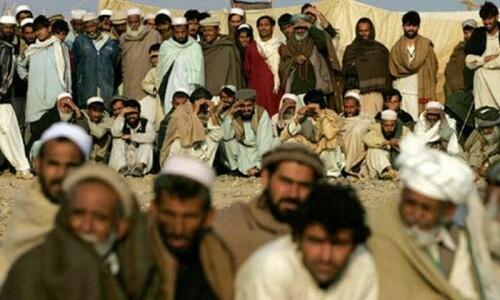ISLAMABAD: Amid all-time high fuel prices in the country, Prime Minister Shehbaz Sharif announced a relief package on Sunday for the poor under which a subsidy of Rs50 will be given to them on every litre of petrol.
“Low-income people will be given a subsidy of Rs50 per litre under the petroleum relief package,” said a press release issued by the Prime Minister’s Office (PMO).
The PM, after presiding over a review meeting on the relief package, said the relief would be given to those low-income consumers who have motorcycles, rickshaws, 800cc cars or other small cars.
He said implementation of the petroleum subsidy scheme would begin soon with the cooperation of departments concerned.
How the scheme will be implemented remains unclear
Musadik Malik, the Minister of State for Petroleum, gave a briefing about the nuts and bolts for implementing the scheme.
Finance Minister Ishaq Dar, Adviser to PM Ahad Cheema, Special Assistant Tariq Bajwa, the finance and petroleum secretaries, and other high-ranking officials attended the meeting.
A source privy to the development told Dawn that the prime minister had discussed the package at a recent cabinet meeting, but nothing has been finalised regarding the mechanism to be followed to give relief to the low income groups.
The cabinet meeting was apprised that a total cross-subsidy of Rs120 billion was required to provide subsidised fuel to motorcyclists, rickshaws and 800cc cars.
There was a proposal that the targeted groups could be registered to get the cross-subsidy and must be linked with the State Bank of Pakistan (SBP) to get a one-time password for receiving petrol at subsidised rates. According to the proposal, the beneficiaries must be qualified and registered with the Benazir Income Support Programme (BISP). But the fact is that neither most of the motorbike owners have digital access to banks nor are they registered with the BISP.
It is feared that due to complications and attitude of petrol pump dealers, the plan may not become a successful endeavour.
The government raised the prices of petrol and high-speed diesel (HSD) by Rs5 and Rs13 per litre, respectively, on March 15.
After the revision, the price of petrol has risen to Rs272 per litre while the price of HSD stands at Rs293 per litre. The kerosene rate has jumped to Rs190.29 per litre while that of LDO remains at Rs184.68.
On Feb 28, Finance Minister Ishaq Dar had announced a reduction in the price of petrol by Rs5 per litre and kept the price of HSD unchanged at Rs280 per litre.
Forex woes
Earlier this month, it emerged that the country’s oil industry was facing problems in arranging crude oil and petroleum products owing to foreign exchange constraints and the prevailing product pricing, particularly following the recent currency depreciation and increase in the State Bank’s (SBP) policy rate.
Reporting these challenges to the government, the Oil Companies Advisory Council (OCAC) — an association of more than three dozen major oil marketing companies (OMCs) and refineries — warned of disruption to an already fragile supply chain.
In a communication to the ministers for finance and energy, the SBP governor and the chairman of the Oil and Gas Regulatory Authority (Ogra), the association sought an urgent engagement to address the “severe impact of the recent depreciation in rupee’s value”.
The oil industry called upon the government to ensure that the banking sector enhanced limits for oil companies and refineries, enabling them to manage the impact of increased oil prices and rupee depreciation.
It was critical for survival of the sector and integrity of the POL supply chain, according to representatives of the industry.
Published in Dawn, March 20th, 2023














































